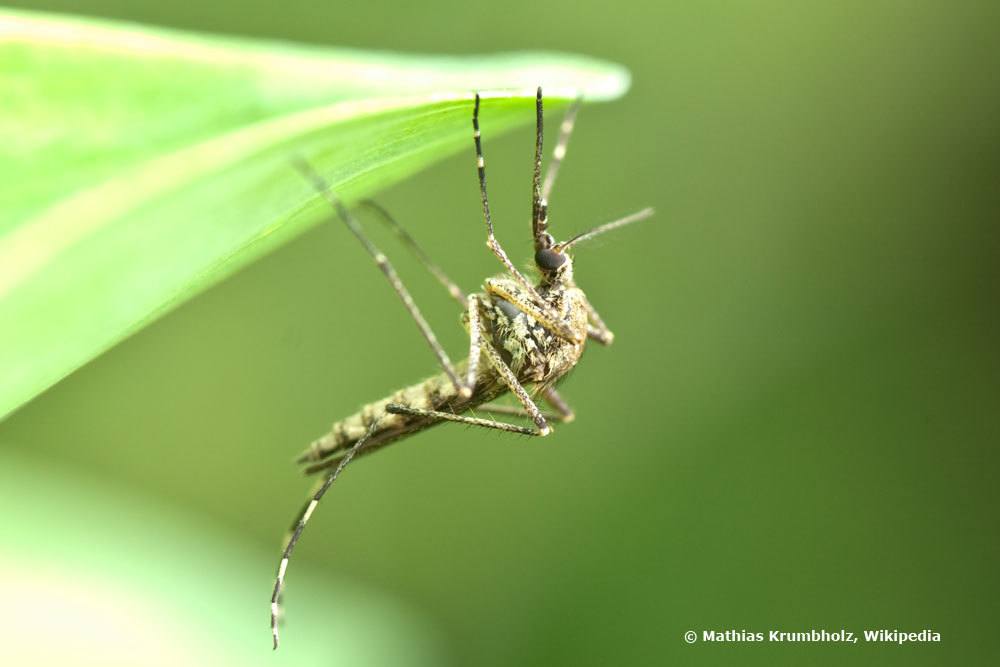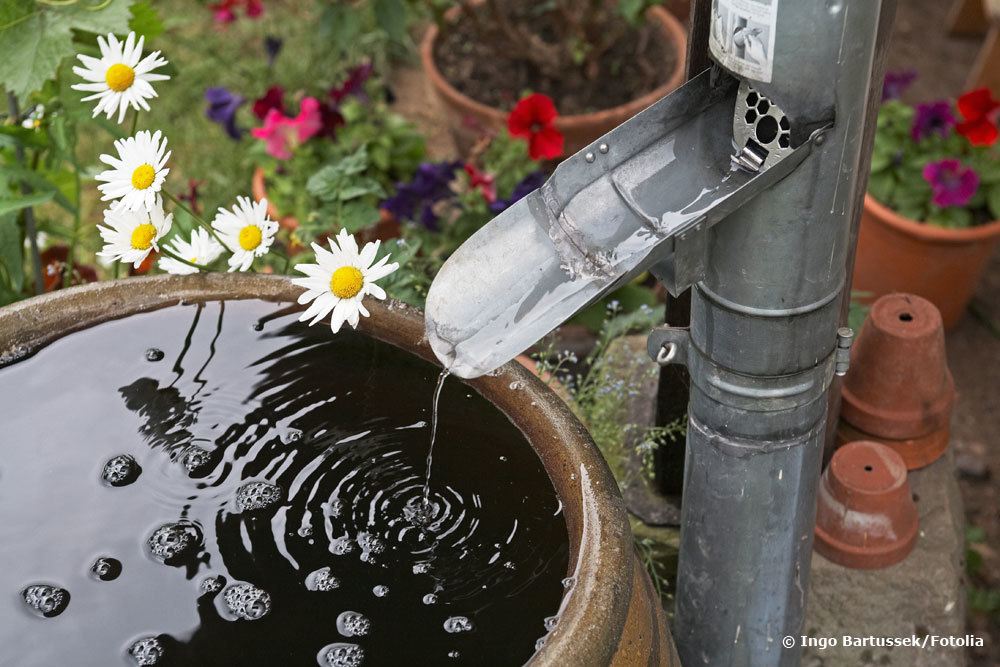Mosquitoes are one of the biggest pests over warm summers. The little bloodsuckers continue to multiply rapidly and are difficult to control once they become adults. For this reason, mosquito larvae must be killed before they can grow into biting adults. So you need to kill the larvae directly in the water, especially the rain barrel and the garden pond, as these are very popular places to lay eggs.

Contents
Eliminate mosquito larvae in the water?
Mosquitoes are insects that reproduce by laying eggs in stagnant water after a female mosquito has laid them there. For egg laying, not only fertilization by male mosquitoes, easily recognizable by their bushy antennae, but also the blood of other animals, first and foremost mammals, is required. If the eggs were laid in water, they hatch after three days and the larvae are fully grown after about three weeks. Mosquito larvae cannot defend themselves or escape because a rain barrel or garden pond is limited. So you have three weeks to effectively control the larvae and avert a mosquito infestation.
Prevention
The best thing you can do about mosquito larvae is to prevent them from laying eggs. The fewer opportunities you provide for the female mosquitoes to lay eggs, the fewer larvae you will end up having to kill. You need to pay special focus on the availability of standing water sources, as these are perfect for larvae. These include:
- Rain barrels
- Garden pond
- Puddles
- bowls or other containers that fill up when it rains
- clogged rain gutters
- Pools
You don’t have to worry about drinking bowls for dogs or other animals. These are used, refilled and cleaned so frequently that eggs cannot hatch there. When preventing them, follow the points below to protect your yard, especially your rain barrel, from the insects as much as possible:
Rain barrel
Rain barrels can be easily covered with fly nets or special mosquito nets. These prevent the animals from getting into the barrel in the first place and laying their eggs there. A lid is not enough for this in most cases, as the bloodsuckers can get into it via the rain gutter. In itself, it is sufficient if you cover the open barrel with a grid and fix it with a cord. If the downpipe extends into the barrel, cut a hole in the fly mesh, cover the end of the downpipe with fly mesh and put the pipe back into the barrel via the hole.
If you do want to use a lid, be sure to keep it closed. Likewise, the lid should not have a hole for the gutter, as insects can easily get inside the barrel through it. Open the garbage can only when it is raining and keep the lid closed in dry and especially humid weather. This will reduce the chance of mosquitoes getting into the barrel

Empty water container
Periodically pour out other containers with collected water. It is best to store them so that water cannot accumulate, for example, in the shed. Be sure to always completely use up your watering can, as this is also where mosquitoes will lay eggs. If you have any water left over after watering, it is best to pour it back into the can immediately. Since watering cans are usually moved during use, mosquitoes avoid them for egg laying.
Check
Starting in April or May, at the latest when temperatures are between 18 °C and 20 °C, check your barrels regularly for egg packs. If you discover the accumulation of eggs, it is best to scoop them off with a fine-mesh landing net. This method is laborious but effective and must be done throughout the spring through fall. You can even use a large landing net such as a pool net, as they are perfect for this. However, be careful of the other inhabitants when doing this if you use the landing net for the pond.
Of course, you can always empty your barrel if you discover eggs. However, the waste of water is quite high and in the end not worth it at all.
Pool
You can easily counteract larvae in the pool by adding chlorine. The agent prevents the development of the eggs and thus the insects can not even hatch. If you prefer a natural pool, i.e. without chlorine, you should definitely make use of your pool net and cover. If you are not going to be in the water for an extended period of time, simply cover it and you will no longer have to worry about mosquito eggs.
Refrain from covering backyard ponds with fly screens, even if the days are muggy. By doing so, you could disrupt the natural cycle of the inhabitants. Garden ponds cannot be protected from mosquitoes unless the water surface is constantly moving. Nevertheless, the above tips will help to significantly reduce the amount of mosquito larvae without wasting valuable water. However, if you want to fight mosquito larvae that have already hatched, you will have to resort to harsher means.
Tip: Also pay attention to the coasters of your flower pots and tubs when preventing. These can fill with water and thus enable egg laying.
Fighting mosquito larvae in the rain barrel: instructions
Rain barrels are most often chosen by pests as a breeding ground, especially if there is no pond or other body of water nearby. For this reason, you need to rely on home remedies to combat the larvae so that you are not covered in bites over the summer. For this, there are two home remedies that you may already have at home and can use immediately:
Home Remedy
- biodegradable dishwashing detergent.
Use organic dishwashing detergent, such as from the following companies, and you’ll have an effective home remedy for mosquitoes at your fingertips:
Ecover
Sonett
The dishwashing liquid lowers the surface tension and the mosquito larvae suffocate. Just a few drops are enough for this. The advantage of biodegradable detergent are the ingredients. These do not have a negative effect on plants, animals and microorganisms and the detergent water can even be used for watering afterwards.
Tip: Do not use dishwashing detergent with ingredients such as orange oil. This is toxic to aquatic organisms and plants and is difficult to degrade.
- vegetable oil
Vegetable oil also has an effective effect on the surface tension of the water, but causes the mosquito larvae to suffocate even faster. You can use any type of oil for this purpose, from olive to canola to sunflower oil. To do this, proceed as follows:
- apply the oil only to barrels that are not in direct sunlight
- since oil floats on the surface of water, it becomes rancid due to the sun’s rays
- add 2 – 3 tablespoons to the water
- stir the surface a little, so that the oil is distributed even better
- after the mosquitoes have died, skim off the oil and the “mosquito corpses”.
Of the two options, the dishwashing liquid is recommended because you don’t have to skim it off and it has no side effects as long as it is biodegradable.
Killing mosquito larvae in the garden pond: instructions
For killing mosquito larvae in the pond, do not use vegetable oils or dishwashing liquid, even if it is biodegradable. The reason for this is the side effects such as foaming of the dishwashing liquid, which could have negative effects on the pond inhabitants. Therefore, for garden ponds, only special ones are used, which are based on natural proteins that have a lethal effect on mosquito larvae. These proteins pose no danger to fish, mammals, plants, birds, other insects and various microorganisms and are offered by the following companies, among others:
Neudorff:
Culinex:
The duration of action of one tablet is sufficient for about four weeks. This means that one pack will last you for the entire year, depending on the size of the body of water. Normally, one tablet is used for 1,000 liters of water. Just throw it into the garden pond and the active ingredients will kill the larvae. Be careful, however, that your mucous membranes do not come into direct contact with the tablet. Especially your eyes could suffer severe damage.

